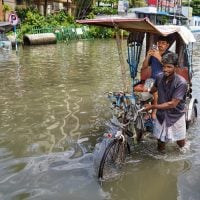Access to clean and safe drinking water is a fundamental human right, yet millions of people around the world still lack this essential resource. In underserved communities, particularly in developing regions, the absence of reliable water sources can lead to dire health consequences, economic stagnation, and social instability. The challenges faced by these communities are multifaceted, often stemming from a combination of poverty, inadequate infrastructure, and environmental degradation.
As a result, addressing water access issues is not merely a matter of convenience; it is a critical step toward improving overall quality of life and fostering sustainable development. In many cases, the struggle for water access is exacerbated by systemic inequalities that leave marginalized populations without the resources or political clout to advocate for their needs. Women and children are often disproportionately affected, as they are typically responsible for collecting water for their households.
This burden can limit educational opportunities and economic participation, perpetuating cycles of poverty. Therefore, it is imperative for NGOs and community organizations to engage in targeted efforts to improve water access in these underserved areas. By leveraging grants and funding opportunities, these organizations can implement sustainable solutions that not only provide immediate relief but also empower communities to take charge of their water resources.
The Importance of Grants in Addressing Water Access Issues
Addressing the Funding Gap
Grants can be instrumental in bridging the funding gap that often exists in low-income areas, enabling organizations to create impactful change. Moreover, grants often come with additional resources such as technical assistance, training, and networking opportunities. This holistic support can enhance the capacity of local organizations to manage projects effectively and sustainably.
Fostering Local Ownership
For instance, a grant may not only fund the construction of a new well but also provide training for community members on maintenance and management practices. This approach fosters local ownership and ensures that the benefits of improved water access are long-lasting.
Amplifying Impact
By securing grants, NGOs can amplify their impact and contribute to the broader goal of achieving universal access to clean water.
Government Grants for Water Infrastructure Improvement
Government grants are a vital source of funding for water infrastructure improvement projects. Many countries have established programs aimed at enhancing water access in underserved communities through federal or state-level funding initiatives. These grants often prioritize projects that address urgent needs, such as repairing aging infrastructure or expanding access to safe drinking water in rural areas.
For NGOs working in this space, understanding the landscape of government funding opportunities is crucial for securing the necessary resources. One notable example is the U.S. Environmental Protection Agency’s (EPA) Drinking Water State Revolving Fund (DWSRF), which provides financial assistance to states for improving drinking water infrastructure.
Through this program, states can offer low-interest loans and grants to local governments and nonprofit organizations working on water projects. By tapping into such government resources, NGOs can significantly enhance their capacity to implement large-scale initiatives that benefit entire communities. Additionally, collaborating with local government agencies can strengthen project proposals and increase the likelihood of securing funding.
Nonprofit Grants for Community Water Projects
Nonprofit organizations are increasingly stepping up to address water access challenges through targeted grant programs. These grants are often designed to support innovative solutions that empower communities to take control of their water resources. Nonprofits may focus on specific issues such as rainwater harvesting, groundwater recharge, or the development of community-managed water systems.
By providing funding for these initiatives, nonprofit grants can help catalyze change at the grassroots level. For instance, the Water.org organization has been instrumental in providing microloans for water and sanitation projects in developing countries. Their approach not only addresses immediate water access needs but also promotes financial inclusion by enabling families to invest in their own solutions.
Such models demonstrate how nonprofit grants can be leveraged to create sustainable change while fostering community engagement and ownership. NGOs should actively seek out partnerships with nonprofit organizations that align with their mission to maximize their impact on water access issues.
Corporate Grants for Water Access Initiatives
Corporate grants represent another significant avenue for funding water access initiatives. Many corporations recognize their social responsibility and actively seek to contribute to community development through philanthropic efforts. These corporate social responsibility (CSR) programs often focus on environmental sustainability and improving access to clean water as part of their commitment to social impact.
NGOs can benefit from these partnerships by aligning their projects with corporate goals and demonstrating how their initiatives contribute to broader sustainability objectives. A prime example is Coca-Cola’s “Replenish Africa” initiative, which aims to improve access to clean water and sanitation across Africa. Through this program, Coca-Cola partners with local NGOs to implement projects that enhance water supply systems and promote hygiene education.
By collaborating with corporations like Coca-Cola, NGOs can tap into substantial funding resources while also gaining access to valuable expertise and networks that can enhance project implementation. Building relationships with corporate partners can be a strategic move for NGOs looking to expand their reach and impact in underserved communities.
Foundation Grants for Sustainable Water Solutions
Foundation grants are another critical source of funding for sustainable water solutions in underserved communities. Many philanthropic foundations prioritize environmental sustainability and social equity in their grantmaking strategies, making them ideal partners for NGOs focused on improving water access. These grants often support innovative approaches that address the root causes of water scarcity while promoting long-term sustainability.
For example, the Bill & Melinda Gates Foundation has invested heavily in research and development of new technologies aimed at improving sanitation and water access in developing countries. Their focus on innovation has led to groundbreaking solutions such as affordable water purification systems and low-cost sanitation facilities. NGOs can benefit from foundation grants by aligning their projects with these innovative approaches and demonstrating how they contribute to broader goals of sustainability and equity.
By leveraging foundation support, organizations can implement transformative projects that have a lasting impact on communities.
International Grants for Water Access in Developing Countries
International grants are essential for addressing water access challenges in developing countries where local resources may be limited. Various international organizations and agencies provide funding specifically aimed at improving water supply systems, sanitation facilities, and hygiene education programs in underserved regions. These grants often focus on collaborative efforts that involve local communities, governments, and NGOs working together toward common goals.
The United Nations Development Programme (UNDP) is one such organization that offers international grants for water access initiatives. Their projects often emphasize integrated approaches that consider environmental sustainability, social equity, and economic viability. By applying for international grants, NGOs can tap into a wealth of resources and expertise that can enhance their capacity to implement effective solutions in challenging contexts.
Furthermore, these grants often come with opportunities for knowledge sharing and collaboration with other organizations working on similar issues globally.
How to Apply for and Secure Water Access Grants
Securing funding through grants requires a strategic approach that involves thorough research, careful planning, and effective communication. NGOs should begin by identifying potential grant opportunities that align with their mission and project goals. This involves researching government programs, nonprofit foundations, corporate CSR initiatives, and international funding sources that focus on water access issues.
Once potential grants have been identified, organizations should develop a compelling proposal that clearly outlines the project’s objectives, target population, implementation plan, budget, and expected outcomes. It is essential to demonstrate how the project aligns with the funder’s priorities and how it will create sustainable change within the community. Engaging stakeholders throughout the proposal development process can strengthen the application by ensuring that it reflects community needs and perspectives.
Additionally, building relationships with funders can significantly enhance an NGO’s chances of securing grants. This may involve attending networking events, participating in workshops or webinars hosted by funders, or reaching out directly to discuss project ideas before submitting a formal application. By establishing rapport with potential funders, organizations can gain valuable insights into their priorities and preferences, ultimately increasing the likelihood of success.
In conclusion, addressing water access issues in underserved communities requires a multifaceted approach that leverages various funding sources including government grants, nonprofit support, corporate partnerships, foundation investments, and international aid. By understanding the landscape of available grants and developing strategic proposals that align with funder priorities, NGOs can secure the necessary resources to implement impactful projects that improve water access and promote sustainable development in vulnerable communities worldwide.









































